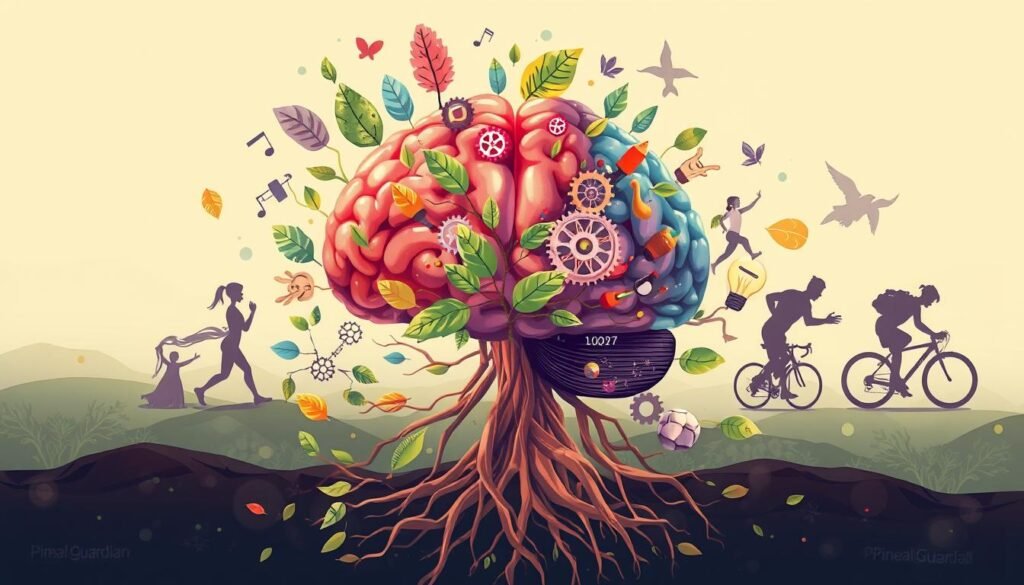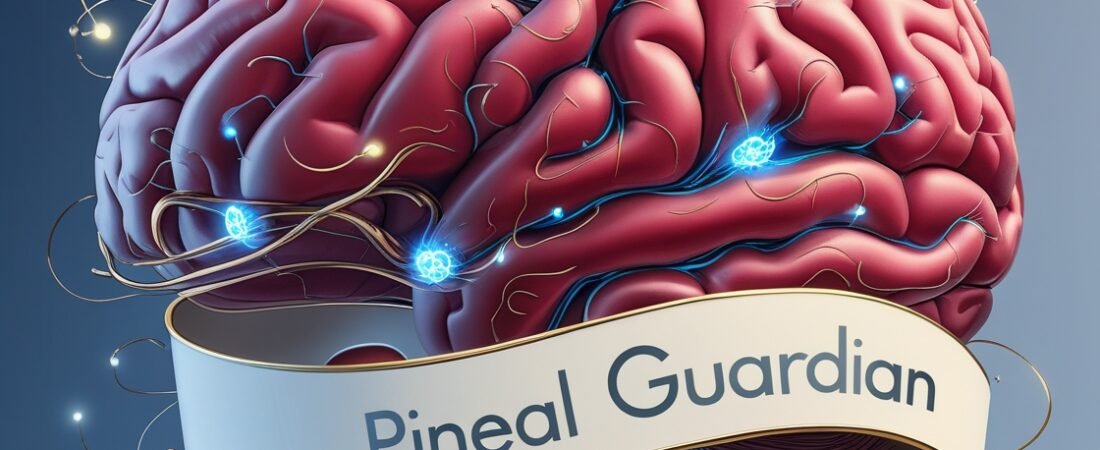This website contains affiliate links. Some products are gifted by the brand to test. As an Amazon Associate, I earn from qualifying purchases. The content on this website was created with the help of AI.
How do lifestyle changes help improve brain health and memory? What role does brain nutrition and physical activity play in cognitive function1? Brain health and memory are closely linked. Understanding how diet, exercise, and social interaction affect our brains is key to good brain health.
The Mayo Clinic says that physical activity, social interaction, and a healthy diet boost brain health and memory. This shows the importance of a whole-body approach to brain nutrition and cognitive function.
Managing chronic health issues like high blood pressure, diabetes, and obesity is vital for memory1. Doing mentally stimulating activities can also slow down memory loss1. Aerobic exercise is a top way to improve brain health, showing a strong link to better thinking2.
Cognitive health is about being able to think, learn, and remember well. This is crucial for daily life3.
Key Takeaways
- Physical activity, social interaction, and a healthy diet are essential for maintaining good brain health and memory.
- Regularly managing chronic health conditions is crucial for maintaining memory function1.
- Engaging in mentally stimulating activities can help slow memory loss1.
- Aerobic exercise is a top method to improve brain health, suggesting a significant correlation with better cognitive functioning2.
- Cognitive health encompasses various functions, including the ability to think, learn, and remember clearly3.
- Brain nutrition plays a critical role in maintaining cognitive function and brain health.
Understanding Brain Health and Memory Function
Brain health is complex and vital for our cognitive function and memory. The brain controls our body’s functions, like movement and mental clarity. Studies from Johns Hopkins Medicine show that exercise, especially aerobic, boosts brain health and memory4.
Doing brain exercises regularly can improve mental clarity and memory. Activities like reading, puzzles, and learning new skills are great. A healthy lifestyle, including a balanced diet and enough sleep, is also key for brain health. People who exercise regularly have a 30-40% lower risk of cognitive decline4.
Some interesting facts about the brain include:
- The average adult brain weighs about 3 pounds4.
- The brain is about 60% fat, with the rest being water, protein, carbs, and salts4.
- Gray matter, which makes up half of the brain, is key for processing information4.
Neurological disorders like Alzheimer’s and dementia can harm our memory and cognitive function. In 2018, about 50 million people worldwide had dementia, with numbers expected to rise to over 152 million by 20505. Knowing how memory works can help us keep our brains healthy and prevent decline.
The Role of Lifestyle in Cognitive Performance
A healthy lifestyle, including a balanced diet and regular exercise, can help reduce the risk of cognitive decline6. The National Institute on Aging suggests that such a lifestyle can have a significant impact on brain health. A study analyzed data from 586 participants followed for up to 24 years. It found that higher lifestyle scores were associated with better cognitive functioning6.
This highlights the importance of lifestyle factors, such as diet and physical activity, in supporting cognitive health. It also shows that they might reduce the need for brain supplements7.
Research has shown that individuals who rate their episodic memory and executive function as excellent or very good report significantly higher rates of mental well-being7. A sense of purpose in life has also been found to be associated with a 20% reduction in the risk of dementia7. Additionally, aerobic exercise has been shown to enhance performance on cognitive tests, particularly in women7.
Overall, a healthy lifestyle, combined with the potential use of brain supplements, can play a crucial role in supporting cognitive health. It can also reduce the risk of cognitive decline8.
In conclusion, the role of lifestyle in cognitive performance is multifaceted, involving diet, exercise, and mental well-being. By adopting a healthy lifestyle and considering the use of brain supplements, individuals can take proactive steps. They can support their cognitive health and reduce the risk of cognitive decline6.
Essential Nutrients for Brain Health and Memory
Eating foods rich in essential nutrients is key for brain health and memory. The Mayo Clinic suggests eating lots of fruits, vegetables, and whole grains for brain support9. Omega-3 fatty acids are also vital for learning and memory10. You can find them in fatty fish like salmon, and in plants like flaxseeds and chia seeds11.
Antioxidants, found in foods like blueberries and dark chocolate, protect the brain from harm10. They help keep memory sharp. Eating foods high in fiber, like whole grains, beans, and veggies, also boosts gut health. This is good for the brain11.
Some supplements can also help with brain health and memory. Omega-3 fatty acid supplements, for instance, support brain function and memory9. Always talk to a doctor before taking any supplements.
Here are some foods that are good for brain health and memory:
- Fatty fish, such as salmon and sardines10
- Nuts and seeds, such as walnuts and chia seeds11
- Whole grains, such as brown rice and quinoa9
- Leafy green vegetables, such as spinach and kale10
Physical Exercise and Mental Acuity
Regular physical exercise is key for keeping your brain health and memory sharp. It boosts cognitive function and lowers the chance of losing mental sharpness12. Adults should aim for 150 minutes of moderate activity each week or 75 minutes of intense activity12.
This can be split into smaller parts, like 22 minutes a day or 30 minutes five days a week12.
Research shows exercise is good for the brain at any age, backed by brain scans over the past ten years13. It helps keep the brain from losing tissue and makes it work better13. People who exercise more can focus better and think faster13.
Exercise also changes the brain in positive ways, boosting cognitive functioning and happiness14.
Some key benefits of exercise for the brain include:
- It makes learning, memory, and focus better14
- It increases brain tissue in important areas14
- It helps brain growth factors like BDNF and IGF-114

Regular exercise is vital for keeping your brain health and memory in top shape and improving cognitive function12. Adding physical activity to your daily life can lower the risk of losing mental sharpness and boost your mental clarity13.
Sleep’s Impact on Memory Retention
Sleep is key for memory improvement. Studies show that not sleeping enough can cut learning ability by up to 40%15. The brain strengthens memories, especially for skills like playing music, during sleep15. It’s also important to sleep after learning as much as before, showing sleep’s role in learning15.
Doing brain exercises and getting enough sleep can boost memory. The National Sleep Foundation says we need 7-9 hours of sleep each night for our brains to work best. Sleep cycles, happening every 90 minutes, include light, deep, and REM sleep. All are vital for memory15.
Also, sleep issues can harm our thinking and brain health, especially as we age16. The glymphatic system, discovered in 2013, helps clear brain waste while we sleep16. Good sleep habits, like a regular schedule and a quiet sleep space, are good for our brains and memory.
Sleep Cycles and Memory Consolidation
Sleep cycles are crucial for memory strengthening. Each cycle has light, deep, and REM sleep. In these, the brain makes and keeps memories, moving them from the hippocampus to the neocortex for long-term storage15.
Optimal Sleep Habits for Brain Health
Good sleep habits are vital for brain health and memory. This includes a regular sleep schedule, a quiet sleep space, and enough sleep. By focusing on sleep and adding brain exercises and a healthy lifestyle, we can better our memory and thinking skills.
Brain Training Exercises and Activities
Doing brain training exercises and activities can lower the risk of cognitive decline17. Johns Hopkins Medicine found that cognitive training boosts brain function and cuts down cognitive decline risk17. You can do this with memory games, brain challenges, and digital apps.
Brain training includes puzzles, brain teasers, and strategy games. These help improve skills like attention, memory, and problem-solving18. Brain supplements also support brain health by giving it the nutrients it needs.
Staying active in brain training can make your brain work better and lower decline risk19. It’s key to mix up your activities. Include physical exercise, social time, and brain-stimulating tasks. This way, you support your brain health and lower decline risk.
| Activity | Cognitive Benefit |
|---|---|
| Puzzles | Improves problem-solving skills |
| Brain Teasers | Enhances critical thinking |
| Strategy Games | Boosts cognitive flexibility |
Adding brain training to your daily life supports brain health and lowers decline risk17. Don’t forget about brain supplements. They give your brain the nutrients it needs.
Natural Supplements for Cognitive Enhancement
Some natural supplements may help with brain health and memory. The Mayo Clinic says omega-3 fatty acids and antioxidants could support cognitive function20. About 25% of adults over 50 use these supplements for brain health20.
Research shows omega-3 fatty acids might help those with the APOE4 gene mutation if started early20. Also, 13% of the US population is over 65, and many older adults face cognitive issues21.
Here are some supplements that might help with cognitive enhancement:
- Omega-3 fatty acids
- Antioxidants
- Ginkgo biloba
- CDP-choline
- Curcumin
But, it’s important to remember that the science is not always clear. More studies are needed to know how these supplements affect brain health and memory2021.
In summary, natural supplements could be part of a plan to support cognitive function and brain health and memory. But, always talk to a doctor before starting any supplements. This is because they can interact with medicines and quality can vary2021.
| Supplement | Potential Benefits | Notes |
|---|---|---|
| Omega-3 fatty acids | Supports cognitive function, particularly in individuals with the APOE4 gene mutation | May interact with blood thinners |
| Antioxidants | May support brain health by reducing oxidative stress | Varying quality of supplements on the market |
| Ginkgo biloba | May have potential benefits for cognitive function, but evidence is not conclusive | May interact with certain medications |
Stress Management for Better Brain Function
Managing stress is key for a healthy brain. Chronic stress can harm our thinking and increase the risk of serious brain diseases like dementia and depression22. Activities like meditation and mindfulness can help lower stress and boost memory. Studies show that keeping our brains active can even delay brain diseases by up to 15 years22.
Trying new things or learning can wake up our brain and help us remember better23. Exercise, like walking, can be good for our brain and reduce stress. It also makes our brain get more blood and helps fix damaged brain connections23. Plus, paying attention to what we feel during exercise can make us more alert and less stressed23.
Eating well and staying active can cut the risk of health problems linked to stress by about 25%22. Mindfulness has been linked to less stress and better memory, showing how important focus is for remembering things24. Adding stress management, like meditation and exercise, to our daily life can make our brain work better and lower the chance of losing our memory.

- Meditation and mindfulness practices
- Physical activity, such as walking or exercise
- Cognitive training and brain exercises
- Getting enough sleep and maintaining a healthy diet
By focusing on stress management and using these methods every day, we can keep our brain sharp and reduce the risk of losing our memory. This leads to better brain health22.
Conclusion: Building a Brain-Healthy Lifestyle
To keep your brain healthy and your memory sharp, you need a full plan. The Mayo Clinic says25 a good lifestyle includes eating right, exercising, and managing stress. By focusing on brain health and memory, cognitive function, and brain nutrition, you can help your brain stay sharp.
Eating foods full of antioxidants, omega-3s, and vitamins is key26. Also, staying active and doing brain games can boost your thinking skills25. And don’t forget, managing stress and getting enough sleep are crucial for your brain27.
Creating a lifestyle that cares for your brain is important. With the right mix of brain nutrition, exercise, and stress control, you can keep your brain healthy and sharp. This way, you can enjoy a vibrant brain for many years.

